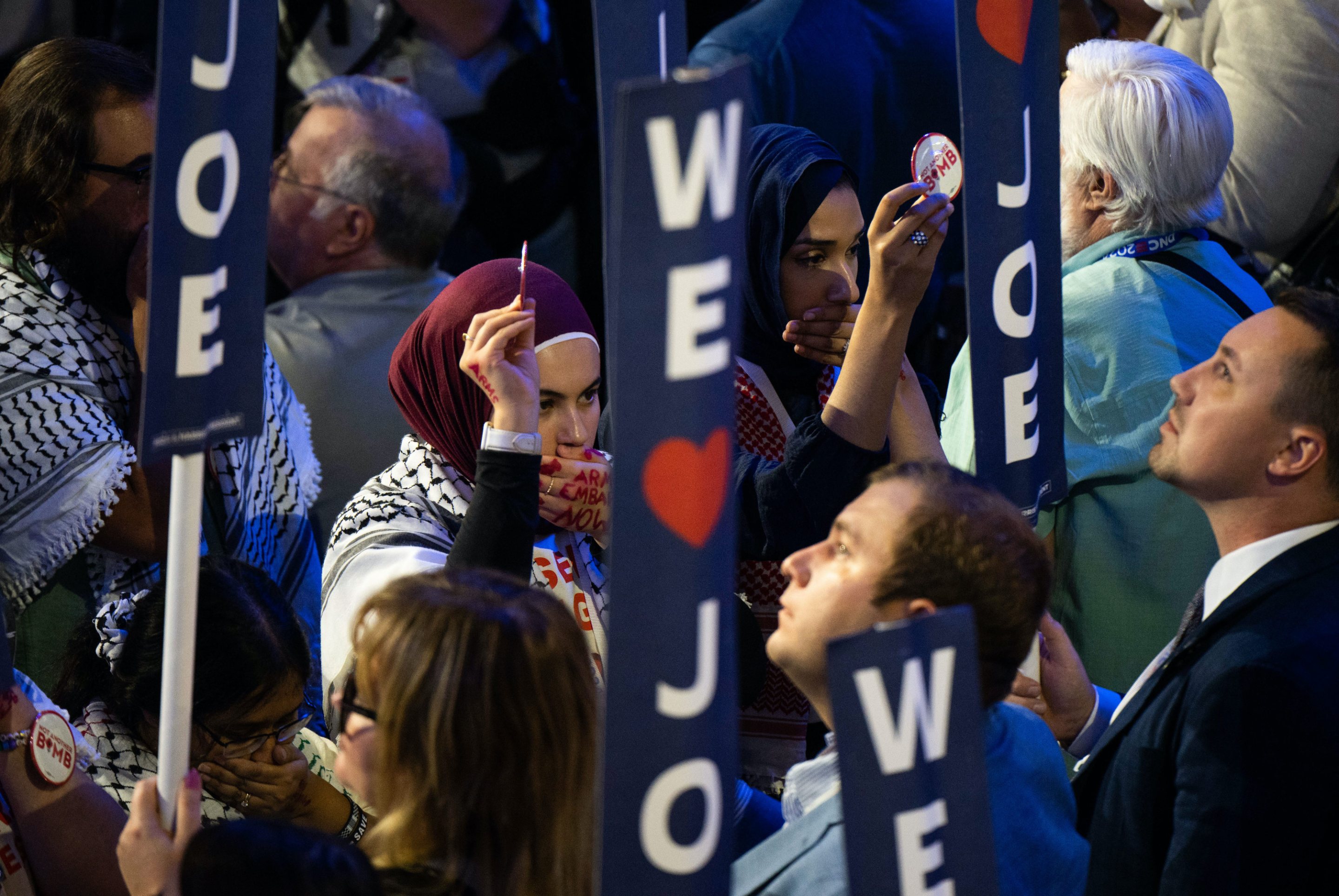In her speech Tuesday at the Democratic National Convention, former First Lady Michelle Obama urged for Americans to take the initiative. “Consider this to be your official ask: Michelle Obama is asking you—no, I’m telling y’all to do something,” she said, before the crowd broke into a chant of "Do something." It was a nice thought, and only that: a nice thought.
Well-intended sentiment was a key theme of the DNC. There was plenty of monologuing about urgency, unity, action. This is the most important election of our lifetimes. Fight back against the divisive hatred of the Republican Party. Stand up for those less fortunate than you, and protect our basic human rights. Bring everyone under the big tent. Do something.
The following day, a group of delegates outside the United Center attempted to do something: Among bigger asks, the Uncommitted movement had been pushing for the DNC to have someone speak on behalf of Palestinians and the genocide in Gaza. There was time allotted to Republicans, cops, and D.L. Hughley. Might it not be prudent to reach out to those 100,000-plus Michiganders who voted "uncommitted" in February's primary, and assure a voting bloc in a swing state that their concerns are being heard?
The Uncommitted movement was not in Chicago on some whim. Co-founded by Abbas Alawieh and Layla Elabed, it was formed to send a message to Joe Biden in his re-election bid, and has evolved to push the Democratic Party to stop sending weapons to Israel and work to end the massacre in Gaza. It is entirely reasonable for an American voter to take issue with their tax dollars going toward bombs used by Israel to turn children into unrecognizable piles of flesh. For this week, one of the Uncommitted movement's smaller goals was to give a voice for Palestinians, perhaps somewhere in between Stevie Wonder and Ana Navarro.
Selected as an uncommitted Michigan delegate, Alawieh was optimistic heading into the week. By late Wednesday night, he was giving a tearful speech outside the arena and sat on the ground until morning, waiting for a phone call that didn't come. Throughout the night, other delegates joined him, and Democratic politicians paid visits either in person or over the phone, but ultimately the Harris campaign offered only a private meeting. In her closing speech Thursday night, Harris included a throwaway line about how she and Biden were working so that "the Palestinian people can realize their right to dignity, security, freedom, and self-determination." The Palestinian people were already pursuing those rights; the U.S. has been actively preventing that from happening.
The line, which received sustained applause, was ultimately as substantial as Michelle Obama's plea to do something. Harris said it after she asserted that Israel had every right to defend itself, a comment that itself came before she referred to "the scale of suffering" in Gaza as "heartbreaking." The cause of that suffering somehow escaped this former prosecutor's scope. Ten months in, and Democratic leadership still wouldn't name who or what has killed over 40,000 Palestinians.
Almost everyone had their say on the big stage. The parents of an American-Israeli hostage were given a speaking slot to call for their son's return. Throughout the week, a progressive-seeming politician here or there mentioned a ceasefire, and the crowd would cheer each time. Mostly this pattern confirmed that calling for a ceasefire had reached the same fate as "Black Lives Matter": a phrase coopted and weighed down with so many qualifications that it had become safe for anyone to say.
The fundamental issue was not something that the Uncommitted movement could fix through proper channels and pragmatism; they certainly tried. Alawieh said he offered to send as many names for speaker as the DNC wanted to choose from. On Thursday afternoon, Mother Jones published the draft of a speech by one of those suggested options: Georgia State Rep. Ruwa Romman, a Palestinian Democrat in a swing state. In her inoffensive remarks, Romman would have wholeheartedly endorsed Harris.
One short speech by Romman or anyone else would not have changed the U.S. government's sponsorship of Gaza's destruction. But the total rejection was instructive in what to expect from a Harris administration. What the Democratic Party and many of its supporters are trying to sell this election is that Harris would be different than Biden on a number of issues, including that of human rights for Palestinians, and yet in no way has she given reason to believe it. It's wishcasting. If words matter less than policy, they still matter—especially from a candidate who once compared the Zionist cause to the Selma marches in a private meeting with AIPAC.
Kamala Harris is supposed to mark a turning point without marking it herself. When she states the urgency of a ceasefire in Gaza, these words are supposed to mean something in the face of the $20 billion of weapons approved for Israel earlier this month. The appearance of urgency is more important to the campaign than urgency itself, so no voice for Palestine could be allowed such a large platform. If they merely stated facts, if a wider audience could hear the firsthand account of a volunteer doctor as he described children carried in pieces by their loved ones, or a pregnant woman with burns all over her body who couldn't be saved because Israel wouldn't permit medical supplies into Gaza, that could be troublesome for the Democratic Party. They might actually have to do something.






